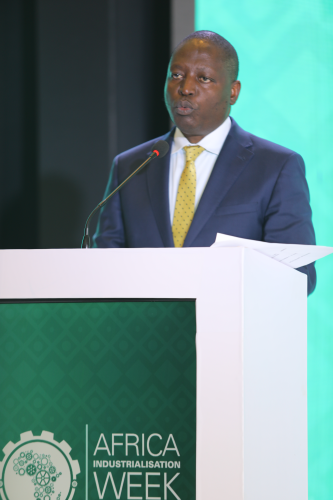KAMPALA, November 18, 2025 — The State Minister for Industry, David Bahati, has said that for African countries to fully industrialise their economies, they must reduce the cost of capital if the continent’s people are to realise their investment dreams and aspirations.
Bahati made the remarks yesterday while officiating at the event in Munyonyo, Kampala. He stated that deliberate efforts are needed to lower the cost of capital and increase the availability of patient capital for manufacturing if African countries are to achieve industrialisation.
“Manufacturing and industrialisation need patient capital and low monetary rates. We must continue addressing these costs to encourage investors and promote industrialisation,” Bahati said.
The minister also pointed to corruption and slow decision-making processes as major impediments frustrating investors.
“In Africa, a decision that requires one day will instead take five to six days, and this is even exacerbated by policies adopted from the World Bank and others — for example, the procurement laws that we have,” he noted.
Bahati stressed that Pan-Africanism, at its core, is a commitment to shared prosperity and rejects the notion of individual or national industrial success isolated from the continent as a whole.
“We must recognise that our unity is our greatest cognitive advantage, and organise our industries through the collective strength of our African economies,” Bahati said.
He called for activism built on efficient transport corridors, alongside harmonised African digital economies and policies. This, he said, requires removing trade barriers, taking collective advantage of Africa’s large population, eliminating non-tariff barriers, and supporting the development of regional value chains for industrial growth and economic diversification.
In Uganda, manufacturing constitutes about 24 per cent of total output. Bahati noted that the cost of corruption remains a major bottleneck to the continent’s industrial agenda.
He added that Uganda has US$12 trillion in gold reserves underground but “abundant poverty above ground,” arguing that industrialisation is the only pathway to converting this mineral wealth into prosperity.
The Vice Chairperson of the Private Sector Foundation of Uganda, Sarah Kagingo, challenged delegates to develop strategies enabling small players to access wider markets through artificial intelligence and improved connectivity, which would help overcome deterrent factors within communities.
“Why do we in Africa still refer to ourselves as Francophone and Anglophone? Our infrastructure and payment systems are not connected,” Kagingo noted.
She emphasised the need to increase efficiency, help women and youth access markets, and enable them to enter the money economy to rebalance unequal economic benefits.
Dr Amany Asfour, President of the Africa Business Council, stressed the need to link science, technology and innovation [STI] to industrialisation in order to create new finished products and double regional integrated trade.
Africa Industrialisation Day [AID] was first declared during the 25th Ordinary Session of the Organization of African Unity [OAU] in 1989, when Heads of State and Government recognised that industrialisation is central to Africa’s economic independence, competitiveness and resilience. This declaration, later endorsed by the United Nations General Assembly, affirmed industrial development as a cornerstone for achieving the continent’s long-term growth and structural transformation.
Since 2018, AID has been celebrated with a week of events, dubbed “Africa Industrialization Week” [AIW]. This shift allows for deeper discussions and activities highlighting industrialisation’s critical role in Africa’s development.
This year, AIW is being held in Kampala from November 17-21, 2025, under the theme “Transforming Africa’s Economy through Sustainable Industrialisation, Regional Integration and Innovation.” The theme underscores the centrality of sustainable industrialisation, regional integration and innovation in advancing Africa’s structural transformation agenda.
The Week aims to strengthen policy coherence, mobilise investment and enhance infrastructure to accelerate industrial growth and value addition. It will also promote intra-African trade, foster youth and women’s entrepreneurship, and showcase innovative, home-grown solutions driving Africa’s economic development in line with Agenda 2063: The Africa We Want.
Held on the margins of AIW, the 4th Edition of the African Women in Processing Forum [AWIP] and the 1st African Youth Start-ups Forum will provide dedicated platforms to empower women-led enterprises and youth innovators, strengthen participation in value chains, and catalyse partnerships and investment opportunities across the continent.
The AIW 2025 began with a Media Breakfast session aimed at strengthening partnerships with the press, shaping narratives, amplifying progress, and spotlighting Africa’s industrialization agenda
Buy your copy of thecooperator magazine from one of our country-wide vending points or an e-copy on emag.thecooperator.news
